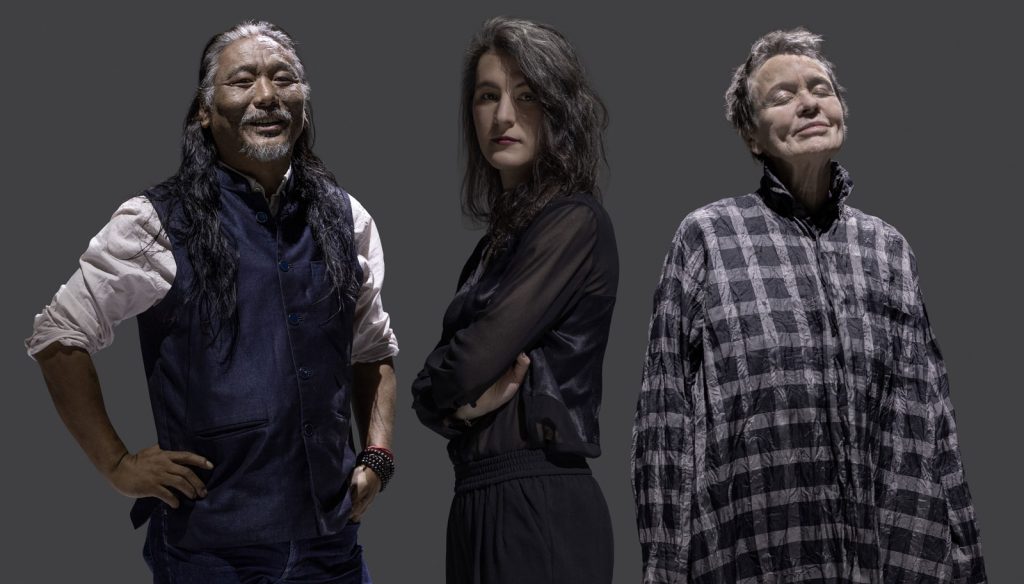What happens to us when we die? Where do we go? What do we do? And what does this tell us about who we are right now—and if we’re even really here at all?
Laurie Anderson, the renowned American visual and performing artist, may just have the answer.
Although Buddha himself was often reluctant to address such grandiose questions, his later disciples took up the challenge. One of history’s most famous explorations of this matter comes from The Bardo Thodol, or The Tibetan Book of the Dead, as it has been known in English since the earliest translation appeared in 1927. This sacred Tibetan Buddhist text lays out detailed descriptions of the forty-nine-day journey of our consciousness from the moment of death to our next rebirth.
Now Anderson has helped recreate much of this journey in the hauntingly beautiful audio odyssey Songs from the Bardo, which pairs key sections of The Bardo Thodol with gongs, flutes, strings, and percussion.
Songs from the Bardo is a collaboration between Anderson and the Tibetan artist and composer Tenzin Choegyal, along with the composer and producer Jesse Paris Smith. Choegyal provides the occasional Tibetan chanting and traditional instruments, while the calm, clear voice of Anderson is heard reciting the English translations throughout.
Believed to have been written and hidden away by the 8th-century Indian Buddhist master Padmasambhava, only to be rediscovered centuries later by the great Tibetan “revealer” Karma Lingpa, the complete text of The Bardo Thodol has just recently been translated into English. And although The Bardo Thodol contains teachings on a wide variety of subjects, the chapters describing our voyage beyond death remain by far the most well known and widely cited in the West. Songs from the Bardo picks up a mere handful of these verses and, with them, creates a series of musical meditations at times spare and at times nearly symphonic, but always fully absorbing and true.
The words themselves may sound familiar to some Buddhist practitioners, for while Choegyal made his own translations, he drew heavily on the work of prior translators, with results that he describes in the excellent liner notes as “very similar to if not the same as the well-known version by Chögyam Trungpa.” (The Trungpa reincarnation lineage has a special relationship to The Bardo Thodol; Karma Lingpa is said to have given first transmission of this teaching to the 13th Karmapa, who then gave it to the eighth Trungpa. The Chögyam Trungpa Rinpoche who became a famous teacher in the West was the eleventh Trungpa tulku [a reincarnated lama], and the partial translation he made with the scholar Francesca Fremantle was just this year reissued in a convenient Shambhala Pocket Library edition.)
Anderson’s first taste of Buddhism was a traditional ten-day vipassana-style retreat, sitting for up to 18 hours a day. Despite suffering incredible pain, she felt meditation opened up her creative vision and aided her artistically. She ultimately became a practicing Buddhist, studying seriously for many years with the Tibetan lama Yongey Mingyur Rinpoche. The idea for Songs from the Bardo came from Choegyal, who invited Anderson and others to perform pieces of The Bardo Thodol with him at the Rubin Museum of Art in New York City in 2016.
Related: How to Navigate the Bardos
This resulting album begins with a traditional “Homage to the Gurus” in both Tibetan and English, then proceeds to a melodic interpretation of the Heart Sutra, recited against a meditative stream of strings. From there, we proceed through the several stages of consciousness beyond death. The listener is addressed throughout as “the Awakened One,” with Anderson providing instruction on how to proceed from this life to the next. “Do not let your thoughts wander,” she explains in the third track. “Having arrived at the time of death, think of nothing but the awakened heart.”
For those of us still attached to our present life, there can be something both liberating and deeply sad in listening to these exhortations to let go of all worldly attachments. Songs from the Bardo asks us to imagine ourselves as “you who are now dead,” and instructs us to “give up attachment and yearning for relatives and friends, sons and daughters, you have left behind.” Many listeners will no doubt find this an unpleasant prospect. Yet at the same time, we can find comfort in the notion that all our work here might someday be complete, that we could at last let go of literally everything. Faced with this vision of final, complete liberation, that vexing text from a friend, colleague, or lover doesn’t seem quite so urgent.
A traditional Tibetan practice calls for a teacher to whisper the words of The Bardo Thodol to us as we pass away, reminding us of how to navigate the path beyond. When my own time comes, I can only hope that someone calls Laurie Anderson, or just plays me this album instead.
Thank you for subscribing to Tricycle! As a nonprofit, we depend on readers like you to keep Buddhist teachings and practices widely available.
